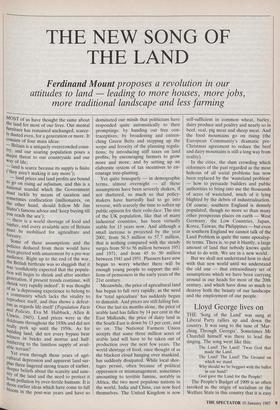THE NEW SONG OF THE LAND
Ferdinand Mount proposes a revolution in our
attitudes to land — leading to more houses, more jobs, more traditional landscape and less farming
MOST of us have thought the same about the land for most of our lives. Our mental furniture has remained unchanged, scarce- ly dusted even, for a generation or more. It consists of four main ideas: — Britain is a uniquely overcrowded coun- try, and our soaring population poses a major threat to our countryside and our way of life; — land is scarce because its supply is finite (they aren't making it any more'); — land prices and land profits are bound to go on rising ad infinitum, and this is a national scandal which the Government must tackle by means of taxation and sometimes confiscation (millionaires, on the other hand, should follow Mr Jim Slater's famous advice and 'keep buying till You reach the sea'); — there is a world shortage of food and timber, and every available acre of Britain must be mobilised for agriculture and forestry. Some of these assumptions and the policies deduced from them would have been greeted with amazement by a pre-war audience. Right up to the end of the war, the British birthrate was so sluggish that it was 'confidently expected that the popula- tion will begin to shrink and after another generation, if present trends continue, will Shrink very rapidly indeed'. It was thought of as 'a depressing experience to belong to a community which lacks the vitality to reproduce itself, and thus shows a defeat- ism as regards life itself' (Population Facts and Policies, Eva M. Hubback, Allen & iinwin, 1945). Land prices were in the doldrums throughout the 1930s and did not really perk up until the 1950s. As for building land, did not every bypass bear witness in bricks and mortar and half- timbering to the limitless supply of avail- able terrain? Yet even through those years of agri- cultural depression and apparent land sur- Plus there lingered strong traces of earlier, deeper beliefs about the scarcity and sanc- tity of the land and the need to protect it front pollution by over-fertile humans. It is those earlier ideas which have come to full bloom in the post-war years and have so dominated our minds that politicians have responded quite automatically to their promptings: by handing out free con- traceptives; by broadening and entren- ching Green Belts and stepping up the scope and ferocity of the planning regula- tions; by introducing stiff taxes on land profits; by encouraging farmers to grow more and more; and by setting up an elaborate system of tax incentives to en- courage tree-planting. Yet quite brusquely — in demographic terms, almost overnight — all these assumptions have been severely shaken, if not shattered, so much so that policy- makers have hurriedly had to go into reverse, with scarcely the time to soften up public opinion for their volte-face. The size of the UK population, like that of many industrial countries, has been virtually stable for 15 years now. And although a small increase is projected by the year 2001, from 56.5 million to 57.7 million, that is nothing compared with the steady surges from 50 to 56 million between 1951 and 1971, and from 45 to 50 million between 1941 and 1951. Planners have now begun to worry whether there will be enough young people to support the mil- lions of pensioners in the early years of the 21st century. Meanwhile, the price of agricultural land has begun to fall very rapidly, as the need for 'total agriculture' has suddenly begun to diminish. And prices are still falling fast. Over the last six months alone, the price of arable land has fallen by 14 per cent in the East Midlands; the price of dairy land in the South-East is down by 13 per cent, and so on. The National Farmers Union accepts that some three million acres of arable land will have to be taken out of production over the next few years. The world shortage of food, once thought of as the blackest cloud hanging over mankind, has suddenly dissipated. While local shor- tages persist, often because of political oppression or mismanagement, sometimes amounting to terrible famine, notably in Africa, the two most populous nations in the world, India and China, can now feed themselves. The United Kingdom is now self-sufficient in common wheat, barley, dairy produce and poultry and nearly so in beef, veal, pig meat and sheep meat. And the food mountains go on rising (the European Community's dramatic pre- Christmas agreement to reduce the beef and dairy mountains is still a long way from reality).
In the cities, the slum crowding which reformers of the past regarded as the most hideous of all social problems has now been replaced by the 'wasteland problem' — how to persuade builders and public authorities to bring into use the thousands of acres of wasteland, much of it lying blighted by the debris of industrialisation. Of course., southern England is densely populated, though no more so than many other prosperous places on earth — West Germany, the Low Countries, Japan, Korea, Taiwan, the Philippines — but even in southern England we cannot talk of the Land Problem in quite the same apocalyp- tic terms. There is, to put it bluntly, a large amount of land that nobody knows quite what to do with. We are in a new world.
But we shall not understand how to deal with that new world until we understand the old one — that extraordinary set of assumptions which we have been carrying around in our heads for most of the 20th century, and which have done so much to destroy both the beauty of our landscape and the employment of our people.










































 Previous page
Previous page